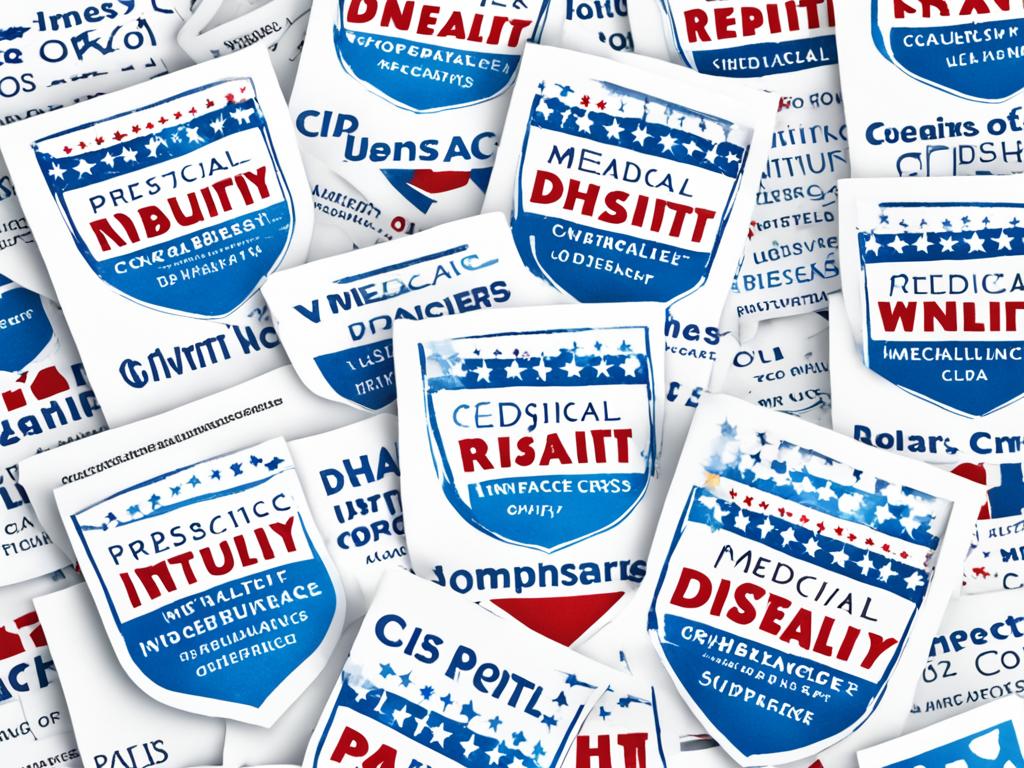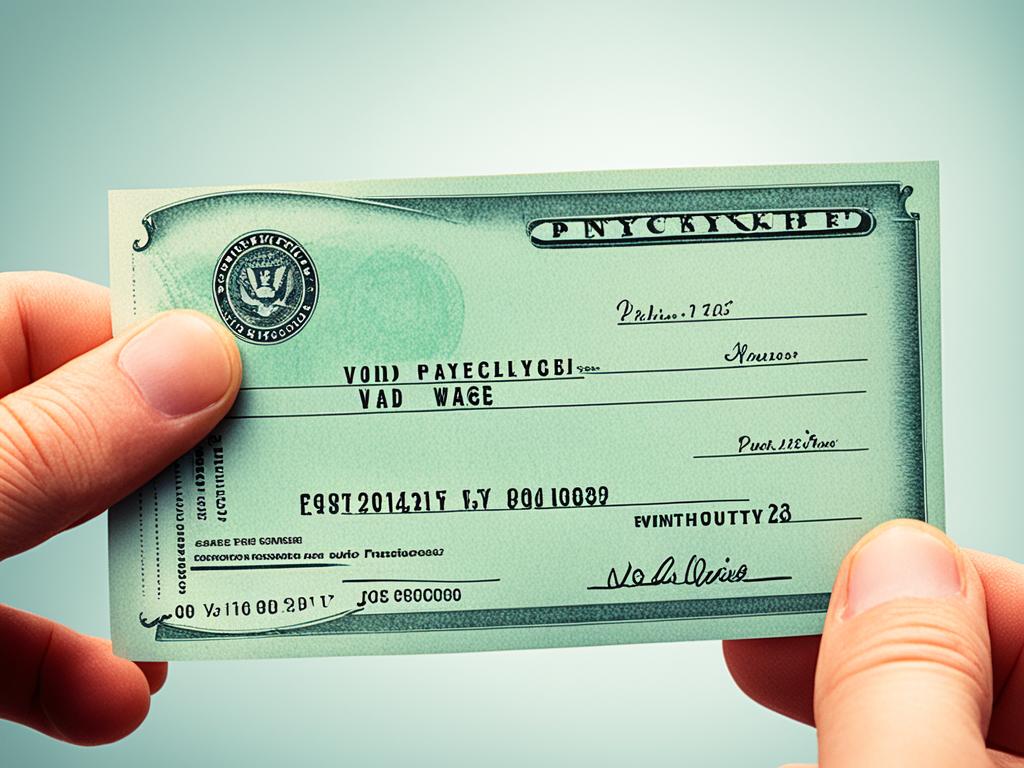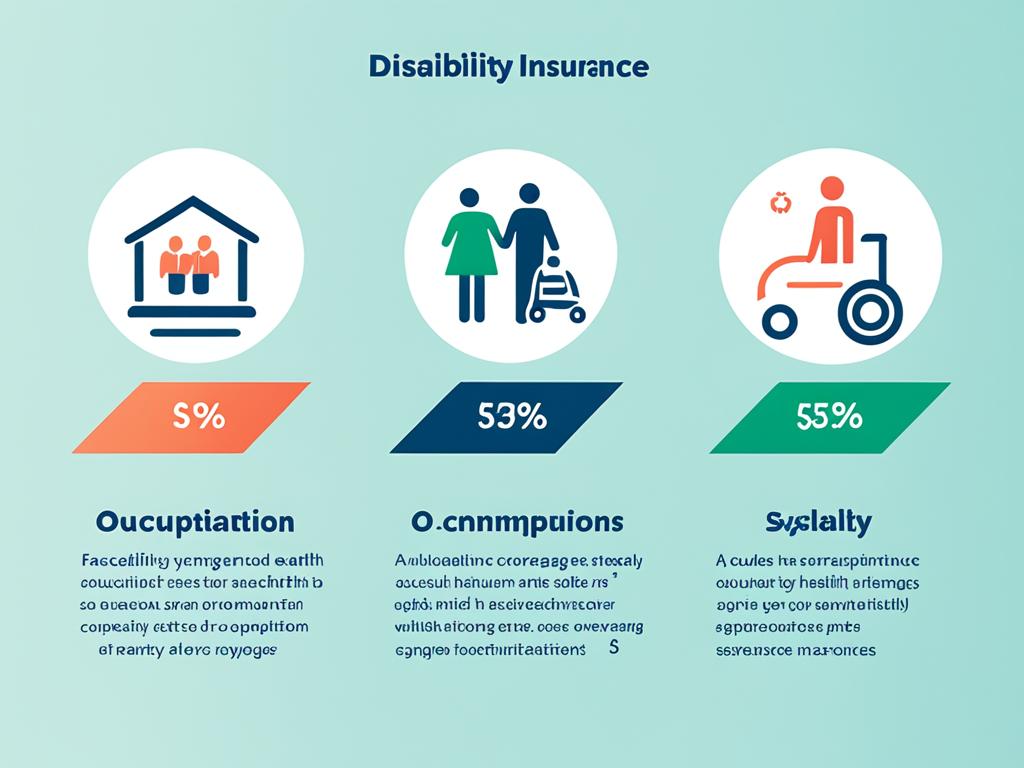As a small business owner, entrepreneur, influencer or freelancer, you are your business, and your business depends entirely on you. Fortunately, insurance is there for you when things take an unexpected turn. Specifically, life insurance provides peace of mind for your business, and all those who depend on you—family, employees and customers—in the event of your death. Similarly, disability insurance provides income for you in the event that you are unable to work due to illness or injury. Small business owners are the force behind their companies, so preparing for worst case scenarios with insurance for small businesses, liability coverage, workers’ compensation, and other essential protections is critical.
Key Takeaways
- Disability insurance provides vital income replacement if you are unable to work due to illness or injury.
- As a small business owner, your business depends on you, so protecting your livelihood with disability insurance is crucial.
- Understanding the different types of disability insurance, including short-term disability, long-term disability, and Social Security disability insurance, is essential.
- Disability insurance can serve as a safety net to help your business continue operating even if you are unable to work.
- Investing in a comprehensive business owners policy (BOP) that includes disability coverage is a smart risk management strategy for small businesses.
The Importance of Disability Insurance for Entrepreneurs
According to the Social Security Administration, one in four people will become disabled in their working life. With these odds, disability insurance becomes a necessary protection for all workers—whether you are an employee or an entrepreneur. Disability insurance can provide at least a portion of your expected income if you are unable to work due to injury or illness. For small business owners, entrepreneurs, and freelancers, disability insurance is critical to protect your business and livelihood.
Disability Insurance as a Safety Net
Disability insurance can serve as a safety net to help you prepare for the unexpected and ensure your company can continue to operate even if you are unable to work. This type of coverage can provide the necessary income replacement to maintain your business and personal financial stability during a period of disability.
Preparing for the Unexpected
As a small business owner or entrepreneur, your ability to work is the foundation of your risk management strategy. Disability insurance helps you prepare for the unexpected by ensuring your business can continue to operate and thrive even if you are faced with a long-term illness or injury. This coverage can provide the financial resources needed to hire temporary help, cover essential business expenses, and maintain your company’s momentum.
Types of Disability Insurance Coverage
When it comes to safeguarding your small business, understanding the different types of disability insurance coverage is crucial. There are several options available, each designed to provide financial protection in the event of an unexpected illness or injury that prevents you from working.
Short-Term Disability Insurance
Short-term disability (STD) insurance provides coverage for a relatively brief period of time, typically up to two years. This type of policy can help replace a portion of your income if you are unable to work due to a qualifying disability, such as an illness, injury, or other medical condition. STD coverage can be an important safety net for small business owners and their employees, ensuring continuity of operations during a short-term absence.
Long-Term Disability Insurance
In contrast, long-term disability (LTD) insurance is designed to provide income replacement for more prolonged or lifelong disabilities. LTD coverage typically kicks in after short-term disability benefits have been exhausted, offering a critical source of financial support for small business owners and workers who are facing an extended period away from work.
Social Security Disability Insurance
In addition to private disability insurance policies, small business owners and their employees may also be eligible for Social Security Disability Insurance (SSDI) benefits. SSDI is a federal program that provides financial assistance to U.S. citizens who have paid into the Social Security system and become disabled to the point where they can no longer work. Understanding the eligibility requirements and application process for SSDI can be an important part of a small business’s risk management strategy.

Disability Insurance for Small Business Owners
As a small business owner, protecting your company and livelihood is of paramount importance. To that end, small business owners can leverage several types of disability and life insurance policies to safeguard their operations. These specialized insurance solutions can provide critical financial support in the event that the business owner or a key employee becomes disabled or passes away.
Key Person Insurance
Key Person Insurance, also known as key man insurance, is a policy that pays out to the business if a crucial owner or employee dies. This coverage can provide the funds needed to find a suitable replacement or wind down the business in an orderly fashion, ensuring continuity and protecting the company’s financial stability.
Buy/Sell Agreement Funding
Another important consideration for small business owners is a Buy/Sell Agreement, which outlines the terms under which a deceased partner’s interest in the company can be acquired by the remaining owners. Funding this agreement through life insurance ensures the surviving owners have the necessary capital to buy out their departed partner’s stake, preventing potential disruptions to the business.
Individual Life Insurance
In addition to key person and buy/sell agreement coverage, small business owners should also consider obtaining individual life insurance policies. These policies can help cover outstanding debts, tax obligations, and other responsibilities in the event of the owner’s passing, safeguarding the business and its stakeholders.
By leveraging a comprehensive suite of disability and life insurance solutions, small business owners can protect their company, their livelihood, and the financial well-being of their employees and loved ones in the face of unexpected events.
Disability Insurance for Employees
While corporations often provide employees with long-term
disability insurance
, small business owners and entrepreneurs typically have to procure and pay for their own disability coverage.
Employer-provided disability benefits can replace up to 66% of an employee’s usual paycheck in the event of a disability. Alternatively, workers can purchase voluntary individual disability insurance policies to supplement employer-provided coverage or obtain additional protection if their employer does not offer disability benefits. Understanding the disability insurance options available to employees is crucial for small business owners to attract and retain top talent.
Employer-Provided Disability Benefits
Many large corporations offer long-term disability insurance as part of their employee benefits package. These employer-provided disability benefits can provide a portion of an employee’s income if they become unable to work due to an injury or illness. Small business owners, however, often have to research and purchase disability insurance coverage independently to protect their own livelihood and that of their team.
Voluntary Employee-Paid Disability Insurance
In the absence of employer-provided disability benefits, employees can explore voluntary individual disability insurance policies to supplement their income in the event of a disability. These disability insurance plans are typically paid for by the employee rather than the employer, providing an additional layer of financial protection. Small business owners should educate their team on the importance of disability insurance and the various coverage options available to them.

Insurance for Small Businesses
As a small business owner, procuring the right insurance coverage is essential to protect your company against potential risks. This includes liability coverage, workers’ compensation, commercial property insurance, business interruption insurance, professional liability insurance, cyber liability insurance, and a business owners policy (BOP). Investing in a comprehensive insurance portfolio can help small businesses manage risks, safeguard assets, and ensure financial stability in the face of unexpected events.
| Insurance Type | Coverage | Importance for Small Businesses |
|---|---|---|
| Liability Coverage | Protects against claims of negligence, errors, or omissions that result in injury or property damage. | Crucial to shield small businesses from lawsuits and financial liability. |
| Workers’ Compensation | Provides benefits to employees for work-related injuries or illnesses, including medical expenses and lost wages. | Legally required in most states to protect both employees and the business. |
| Commercial Property Insurance | Covers the physical assets of a small business, such as the building, equipment, and inventory. | Safeguards a small business’s critical physical resources against damage or loss. |
| Business Interruption Insurance | Replaces lost income and covers expenses if a small business is forced to temporarily close due to a covered event. | Ensures a small business can continue operations and meet financial obligations during unexpected disruptions. |
| Professional Liability Insurance | Protects small businesses and their employees from claims of errors, omissions, or negligence in the provision of professional services. | Critical for businesses that provide professional advice or services to clients. |
| Cyber Liability Insurance | Covers the costs associated with data breaches, cyber-attacks, and other digital threats. | Vital for small businesses that rely on technology and handle sensitive customer or financial information. |
| Business Owners Policy (BOP) | A bundled policy that combines multiple types of coverage, including property, liability, and business interruption insurance. | Provides comprehensive protection in a cost-effective package, making it an attractive option for many small businesses. |
Investing in a thorough insurance portfolio can help small businesses effectively manage risks, safeguard assets, and ensure financial stability in the face of unexpected events. By understanding the various insurance for small businesses, small business owners can make informed decisions to protect their company and prepare for the unexpected.
Disability Insurance and Workers’ Compensation
While
and workers’ serve different purposes, understanding the distinctions between them is crucial for small business owners. insurance provides benefits for work-related injuries or illnesses, covering medical expenses and replacing a portion of lost wages. In contrast, is designed to provide income replacement if you are unable to work due to a non-work-related condition.
Differences Between Disability and Workers’ Comp
The key difference between and is the cause of the injury or illness. Workers’ comp covers incidents that occur on the job, while applies to conditions that arise outside of the workplace. This distinction is important, as the eligibility requirements and benefits provided by each type of coverage can vary significantly.
Benefit Levels and Coverage
Typically, provides higher levels of wage replacement, often covering up to 66% of an employee’s usual earnings. In contrast, policies generally replace a smaller percentage of income, typically 40-60%. However, can offer more comprehensive coverage, including long-term benefits for chronic or permanent disabilities, whereas is typically limited to short-term wage replacement and medical expenses related to the work-related incident.
| Feature | ||
|---|---|---|
| Cause of Disability | Non-work-related | Work-related |
| Wage Replacement | 40-60% of usual earnings | Up to 66% of usual earnings |
| Coverage Duration | Short-term or long-term | Short-term |
| Eligible Expenses | Income replacement | Medical expenses, lost wages |
Understanding the differences between and is crucial for small business owners to ensure they have the right protections in place for their employees and their business. By carefully evaluating the coverage options and eligibility requirements of each type of insurance, small business owners can make informed decisions to manage and safeguard their .

Qualifying for Disability Benefits
To receive disability insurance benefits, policyholders must meet the specific criteria outlined in their policy. The two most common definitions of disability are the “own occupation” and “any occupation” clauses.
Own Occupation Definition
Under the “own occupation” definition, if you are unable to perform the duties of your regular job due to illness or injury, you will be considered totally disabled and eligible for benefits. This definition provides the most comprehensive coverage, as it focuses on your ability to carry out the specific tasks and responsibilities of your usual occupation, rather than your capacity to work in any job.
Any Occupation Definition
The “any occupation” definition is more restrictive, requiring that you be unable to perform the duties of any reasonable job that is suitable for your education, training, and experience. This means you must be unable to work in any occupation to qualify for disability benefits, not just your regular job. Small business owners and entrepreneurs should carefully review and understand the nuances of these definitions when selecting a disability insurance policy to ensure it provides the level of coverage they need.
Disability Insurance Costs and Factors
The cost of
disability insurance
premiums and benefit amounts can vary based on several factors, including age, gender, health history,
occupation
,
income
, and location. Younger, healthier individuals with lower-risk
occupations
will generally pay lower premiums for higher benefit amounts. Factors like pre-existing conditions, dangerous hobbies, and higher
incomes
can increase
disability insurance
rates.
Premiums and Benefit Amounts
When selecting a
disability insurance
policy, small business owners should carefully consider the premium costs and the corresponding benefit amounts. Higher-income individuals or those with riskier
occupations
may need to pay higher premiums to secure adequate coverage and income replacement in the event of a disability. Working with a licensed
insurance
agent can help small business owners explore policy options that fit their budget and
coverage needs
.
Factors Affecting Disability Insurance Rates
The
disability insurance
rates for small business owners can be influenced by a variety of factors, including age, gender, health history,
occupation
,
income
, and geographic location. Younger, healthier individuals working in low-risk
occupations
will generally pay lower premiums, while those with pre-existing conditions, dangerous hobbies, or higher
incomes
may face higher rates. Carefully evaluating these factors can help small business owners find the most suitable
disability insurance
coverage to protect their
business
and
livelihood
State Disability Insurance Requirements
While disability insurance is not generally a government requirement for small businesses, there are a few notable exceptions. Businesses that operate in California, Hawaii, New Jersey, New York, or Rhode Island are legally required to provide their employees with short-term disability insurance coverage. These states have implemented mandatory disability insurance programs to ensure workers have access to income replacement benefits in the event of a non-work-related illness or injury.
Mandatory Disability Insurance States
In the states of California, Hawaii, New Jersey, New York, and Rhode Island, employers must offer short-term disability insurance to their employees. This coverage typically replaces a portion of an individual’s wages for a limited period, often up to 26 weeks, if they are unable to work due to a non-occupational medical condition. Businesses in these states must either purchase a private disability insurance policy or participate in the state-run disability insurance program to comply with the law.
Voluntary Disability Insurance Options
For small business owners located in the remaining 45 states, disability insurance is a voluntary form of coverage, though it is still highly recommended. Exploring the various voluntary disability insurance options available in your state can help you and your employees obtain the necessary income protection. While not mandated by law, investing in disability insurance is a prudent risk management strategy for small businesses to safeguard their operations and financial stability.
| State | Disability Insurance Requirement |
|---|---|
| California, Hawaii, New Jersey, New York, Rhode Island | Mandatory short-term disability insurance coverage for employees |
| All other states | Voluntary disability insurance options available |
Conclusion
In conclusion, disability insurance is a critical form of coverage for small business owners and their employees. It provides vital income replacement in the event of an illness or injury that prevents you from working, protecting your business and livelihood. Whether you are an entrepreneur, freelancer, or have a small team, understanding the different types of disability insurance, coverage options, and eligibility requirements is essential to ensure you have the right protections in place.
Investing in disability insurance is a smart move to safeguard your small business and prepare for the unexpected. By securing the right liability coverage, workers’ compensation, commercial property insurance, business interruption insurance, professional liability insurance, cyber liability insurance, and a business owners policy (BOP), you can effectively manage risks, protect your assets, and ensure the financial stability of your small business.
As a small business owner, it’s crucial to prioritize risk management and meet your unique insurance needs. By working closely with a licensed insurance agent, you can explore the available disability insurance options and build a comprehensive coverage plan that aligns with your budget and protects your company’s future.
FAQ
Why is disability insurance critical for small business owners and employees?
What are the different types of disability insurance coverage?
How can small business owners utilize disability and life insurance to protect their company?
How do employer-provided disability benefits and voluntary individual disability insurance differ?
What is the difference between disability insurance and workers’ compensation insurance?
How do the “own occupation” and “any occupation” definitions of disability affect insurance coverage?
What factors affect the cost of disability insurance premiums and benefit amounts?
Are there any state-level requirements for small businesses to provide disability insurance?
Source Links
- https://lifehappens.org/blog/why-small-business-owners-need-life-and-disability-insurance/
- https://www.uschamber.com/co/start/strategy/disability-insurance-for-small-businesses
- https://www.insureon.com/insurance-glossary/disability-insurance
